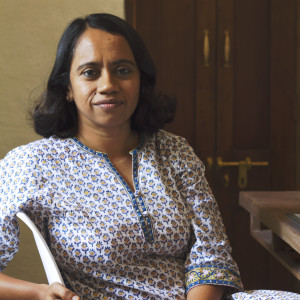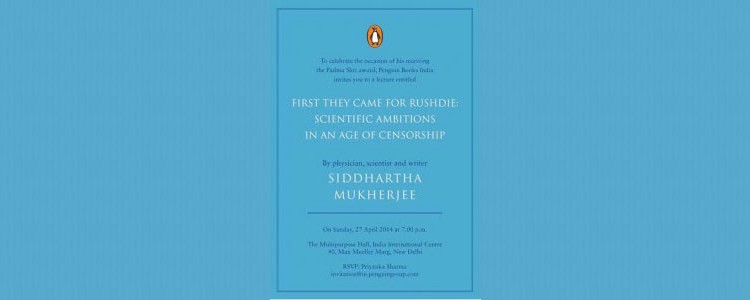
PENGUIN RANDOM HOUSE INDIA ANNOUNCES
PUBLISHING, SALES AND MARKETING APPOINTMENTS &
NEW ORGANIZATIONAL STRUCTURE
New Delhi, 20 March 2014 – Penguin Random House India’s new publishing, sales and marketing leadership appointments and cross-company organizational structure were announced today by Gaurav Shrinagesh, Chief Executive Officer. All changes will be effective 1st April 2014. The company is a division of Penguin Random House, the world’s largest trade book publisher, which was established on 1 July 2013 with the merger worldwide of Penguin and Random House.
Chiki Sarkar, currently Publisher at Penguin Books India, has been appointed as Publisher, Penguin Random House India with overall responsibility for building the local publishing programme in both English and local languages. Random House India’s first editor-in-chief in 2006, she moved to Penguin Books India in 2011 and has been instrumental in publishing many of the sub-continent’s finest writers including Amitav Ghosh, Arundhati Roy, Vikram Seth, Suketu Mehta, Vikram Chandra, Amit Chaudhuri and Pankaj Mishra and has launched the careers of some of the best new talent such as Mohammed Hanif, Shehan Karunatilaka, Basharat Peer, Daniyal Mueenuddin and Aman Sethi. She has recently been announced as one of the World Economic Forum’s Young Global Leaders, a community which assembles the world’s most outstanding next-generation leaders. Chiki will report to Penguin Random House India CEO Gaurav Shrinagesh.
Milee Ashwarya and Meru Gokhale have both been appointed to the role of Publishing Director, Penguin Random House India and will report to Chiki Sarkar.
In her new position Meru Gokhale, currently Editorial Director for Vintage, Random House India, will have direct responsibility for the prestigious Vintage India, Allen Lane, Hamish Hamilton, Viking and Classics publishing lists. Meru has acquired, edited and published books by authors including Paulo Coelho, Kiran Desai, Jamil Ahmad, Sonia Faleiro, Tahmima Anam, Jhumpa Lahiri, Salman Rushdie, Orhan Pamuk, Nadeem Aslam, Rahul Pandita, Basharat Peer and Mohammed Hanif. In 2013 she was awarded the prestigious Jerusalem Editorial Fellowship.
Presently Editorial Director for Ebury India and Random Business, Milee will oversee Ebury India, Random Business, Portfolio, Metro Reads, Shobhaa De Books and Penguin Ananda. Milee joined Random House India in 2008 and has worked across all genres of publishing during her career. She has commissioned, acquired and published bestselling books including From XL to XS, Jugaad Innovation, Dhandha, the IIMA Business series, the MINT Business series and worked with authors including Payal Gidwani Tiwari, Deanne Panday, Cyrus Broacha, Sudeep Nagarkar, Suhel Seth, Preeti Shenoy and Rocky Singh and Mayur Sharma.
Bringing focus to its children’s list, Hemali Sodhi will be taking on the newly created role of Director, Children’s for Penguin Random House India. During her time as Vice President Marketing and Communications, Penguin Books India, Hemali established Penguin as the foremost publishing brand in the country and in her new role she will have responsibility for growing the children’s local publishing program as well as the international list for the Indian market, along with product and brand development for children’s. The current children’s editorial, product and marketing teams will report to her.
Hemali will retain her responsibility for Penguin’s Annual Lecture, Spring Fever and all CSR activity. In addition, Hemali will manage Corporate Communications for Penguin Books India for the foreseeable future. She will report to Gaurav Shrinagesh in all capacities.
Caroline Newbury, currently VP Marketing and Publicity Random House India, will take on the role of VP, Marketing and Corporate Communications for Penguin Random House India and will oversee all marketing, publicity, digital and corporate communications functions for the company. Caroline joined Random House India two years ago after more than a decade with the Ebury Publishing division, Random House UK. She will report to Gaurav Shrinagesh.
Gaurav Shrinagesh, CEO, Penguin Random House India, said:
“Penguin Random House India is home to some of the finest editorial talent in the country, and this new structure ensures we will continue to be at the forefront of trade publishing in India. With the combined expertise of Chiki, Meru and Milee, who have each built lists of considerable repute, I am confident that our reputation for discovering the region’s best new writing talent as well as building the careers of our established authors is in very good hands.
“Children’s publishing is a real and major focus for Penguin Random House not only in India, but globally, and I am delighted that Hemali Sodhi will be overseeing this area in her new role. In her nearly two decades of work with Penguin Books India she has established the Penguin brand into a formidable publishing presence in India, and I know she will transfer these considerable skills into building our local and international children’s publishing list in India.
“In today’s changing retail market the key to driving our authors’ success is discoverability – being able to inform their readers, and potential readers, about their books. Establishing strong direct to consumer relationships is vital to this and in her new role overseeing marketing and digital, Caroline will be driving this for Penguin Random House India.
I am delighted to announce all of these appointments and know my colleagues will work tirelessly to provide a first-class environment for our authors to produce their best works and for these to be enjoyed by the widest possible readership.”
On the sales side, Ananth Padmanabhan has been appointed Senior Vice President, Sales with overall responsibility for sales across all distribution channels of Penguin Random House in India. He will report to Gaurav Shrinagesh.
Currently VP Sales, Penguin Books India, Ananth began his career with the Landmark bookstore in Chennai, in 1992, before joining Penguin Books in 1997. Over nearly twenty years with the company he has been instrumental in shaping the sales, distribution and representation strategy and in building Penguin’s presence across India and the Indian subcontinent.
Formerly responsible for sales for Random House India, Nand Nath Jha has been appointed VP, International Product and Digital Sales, reporting to Ananth. His role will include the entire portfolio of Penguin Random House Group international product and all the agency publishers it represents in India. He will also be responsible for all online and digital sales for the group and sales of children’s product. Nandan has worked in the book trade for two decades, starting his career with distributor India Book House before switching to retail (Crossword, 1995 and Jashanmals, 1998), then moving to Random House in 2000.
Manoj Satti will take on the role of General Manager International Product (Random House) and Sales Planning. Currently responsible for managing Product and Operations at Random House, Manoj began his career with Sterling Publishers and Pearson Education before moving to Random House eight years ago. His new role will involve overseeing the product development for Random House International products and all sales forecasting across PRH portfolio of products. Manoj will report into Nandan for product and Ananth for sales planning.
Rahul Dixit, currently General Manager, Penguin Books India, in his new role as General Manager, Local Publishing and Sales, will now oversee development of product and diversified sales for all local publishing across Penguin Random House India and will continue to lead sales for North India. He will be reporting to Ananth. Rahul started his career with Penguin books in 2005 and has handled diversified sales portfolios within the company.
Gaurav Shrinagesh, CEO Penguin Random House India said:
“Our new sales team represents decades of experience across a wide range of retail-related areas of publishing – distribution, shop-floor bookselling, inventory management, customer service, as well as direct representation. This wealth of knowledge will enable Penguin Random House to continue to ensure our books reach their readers, wherever and however they buy them.
“In their years with Penguin and Random House, Ananth and Nandan have built strong reputations within the industry for their excellent relationships with customers and their expertise in navigating the changing retail landscape. I am confident that supported by Manoj and Rahul’s knowledge of product and insight into sales development, this team will create a firm foundation for continued Penguin Random House growth.”
For further information:
Caroline Newbury, Penguin Random House, [email protected], +91 9953070129
Penguin Random House India is a Penguin Random House company. Penguin Random House (http://www.penguinrandomhouse.com/) is the world’s first truly global trade book publisher. It was formed on July 1, 2013, upon the completion of an agreement between Bertelsmann and Pearson to merge their respective trade publishing companies, Random House and Penguin, with the parent companies owning 53% and 47%, respectively. Penguin Random House comprises the adult and children’s fiction and nonfiction print and digital trade book publishing businesses of Penguin and Random House in the U.S., U.K., Canada, Australia, New Zealand, and India, Penguin’s trade publishing activity in Asia and South Africa; DK worldwide; and Random House’s companies in Spain, Mexico, Argentina, Uruguay, Colombia, and Chile. Penguin Random House employs more than 10,000 people globally across almost 250 editorially and creatively independent imprints and publishing houses that collectively publish more than 15,000 new titles annually. Its publishing lists include more than 70 Nobel Prize laureates and hundreds of the world’s most widely read authors.
About Chiki Sarkar
Chiki Sarkar was educated at Oxford University and worked in Bloomsbury Publishing, London for seven years. In 2006 she returned to India to become the first editor in chief of Random House India. She has been the publisher of Penguin Books India since 2011.
About Milee Ashwarya
Milee Ashwarya studied English literature at Hindu College, Delhi University and began her publishing career at Rupa & Co. In 2008, she joined Random House India as Commissioning Editor and was promoted to Senior Commissioning Editor in January 2011. Working across all genres her list of authors includes Payal Gidwani Tiwari, Pratibha Karan, Cyrus Broacha, Suhel Seth, Preeti Shenoy and Rocky Singh and Mayur Sharma. She is currently Editorial Director of two imprints – Ebury India and Random Business – and is responsible for shaping Random House India’s list of popular fiction and non-fiction in all areas of lifestyle as well as business publishing.
About Meru Gokhale
A graduate of St. Stephen’s College, Delhi and the Columbia Publishing Course, New York, Meru Gokhale began her publishing career in 2004 with Penguin Books India, editing books across fiction and nonfiction, cookbooks, history and current affairs. She acquired, commissioned and edited books from authors including Orhan Pamuk, Kiran Desai, Jamil Ahmad, Sonia Faleiro and Tahmima Anam. She joined Random House as Editorial Director of the newly-created Vintage India in 2011. At Random House she has acquired and worked with authors such as Jhumpa Lahiri, Salman Rushdie, Helen Fielding, Nadeem Aslam, Rahul Pandita, Basharat Peer, Mohammed Hanif, and Abhijit V. Banerjee and Esther Duflo. In 2013 she was awarded the prestigious Jerusalem Editorial Fellowship.
About Hemali Sodhi
Hemali joined the publishing Industry in ’96 as a publicist with Penguin India. She has since shaped Penguin India’s marketing strategy, building a formidable brand which was, in 2012, voted as the #4 most successful brand across industries. Penguin is also the only publisher in the Country to boast its own Literature Festival in Delhi, ‘Spring Fever’ and its own lecture, ‘The Penguin Annual Lecture’, which is the largest open lecture featuring speakers as celebrated as HH the Dalai Lama. Penguin India is the most widely followed and engaged-with Publisher on social media, with its own award winning website, a hugely appreciated facebook and twitter strategy and the only publisher to have a multi-platform Mobile App. Penguin India’s marketing campaigns, both print and digital, have consistently won awards.
Hemali completed her post graduation in English literature, from Delhi University.
About Caroline Newbury
A graduate of Trinity College, Oxford University (M.A. Hons. Ancient and Modern History), Caroline Newbury joined Ebury Publishing, a division of Random House UK in 2001 as a publicity assistant. She worked there for 11 years, rising to Deputy Publicity Director, Ebury Publishing, before moving to Delhi in April 2012.
About Ananth Padmanabhan
Ananth began his career in publishing in ’92 as a bookseller with Landmark bookstores, based in Chennai. He joined Penguin Books in ‘97 and is currently Vice President, Sales. During the course of his career with Penguin, Ananth has shaped Penguin’s sales, distribution and representation strategy and has also been responsible for Penguin India’s digital strategy, including publishing, distribution and sales across channels and partners. He is a graduate from the University of Madras, has studied Publishing from Stanford University and has completed a course in Management from IIM Ahmedabad.
He is also a professional photographer and has done many projects, one of which, on publishing, called Calcutta: Walking in the City, can be seen on www.ananthpadmanabhan.com
About Nandan Jha
A graduate of Commerce from University of Delhi, Nandan Jha has worked in all areas of sales in book trade in the last 20 years. He started his career with a distributor (India Book House) in 1994, switched to retail (Crossword, 1995 and Jashanmals, 1998), and then moved to a publisher (Random House Group UK, 2000). In between, he also dabbled with some publishing (Hindi & English) and freelance sales & marketing representation of several independent publishers for 4 years.
He has held the position of Vice President – Sales at Random House India since April 2010, and is also responsible for the developing and executing digital strategy for the company in the domestic and international markets.
About Rahul Dixit
Rahul joined Penguin in 2005 as assistant sales manager following nearly 4 years of experience in selling school books. He headed Penguin’s North India business from 2008 to 2010 before becoming product manager for Penguin Local in 2011. In his current role as General Manager, he is responsible for all local sales and also manages Penguin’s relationship with two other local publishers Zubaan and Hay House.
About Manoj Satti
Manoj Satti’s career in publishing began in 2000 with Sterling Publishers handling sales and customer service activities. After four years at Pearson Education, where he handled promotional activities for their higher education and schools divisions as well as developing and managing their website, he moved to Random House as sales administrator. Over his seven year career with the company, he has been responsible for sales to distributors and retail across the country, the budgeting, product selection, inventory management and pricing strategy for international titles, Random House’s migration to new Microsoft ERP – Navision and few other IT initiatives – and overseeing imports, distribution and supply chain management. He also had responsibility for the creation of the Knowledge Encyclopedia for special sales which has sold over 650,000 copies.

 DR: In India we have an overwritten book market. The big thrill is to change the market. Big publishers are not to be feared. We will publish in the vernacular too. Some of the rich textured literature exists in the local languages. Hence, Sivapriya is a critical part of the team. We have three to four editors taking vernacular publishing. It will be big play for us. It will be about democratisation of publishing. It cannot be the privy of five big houses anymore, and to enable that we must have vernacular publishing. The idea is to launch a new language list every year.
DR: In India we have an overwritten book market. The big thrill is to change the market. Big publishers are not to be feared. We will publish in the vernacular too. Some of the rich textured literature exists in the local languages. Hence, Sivapriya is a critical part of the team. We have three to four editors taking vernacular publishing. It will be big play for us. It will be about democratisation of publishing. It cannot be the privy of five big houses anymore, and to enable that we must have vernacular publishing. The idea is to launch a new language list every year.














